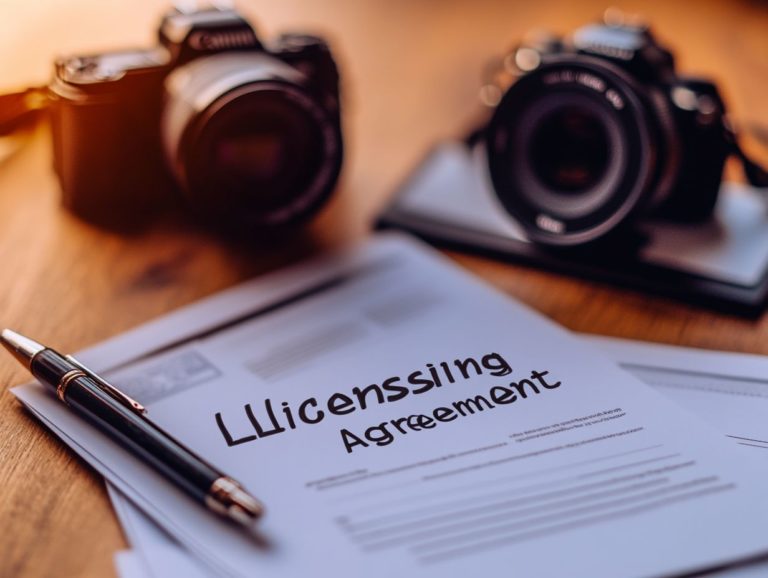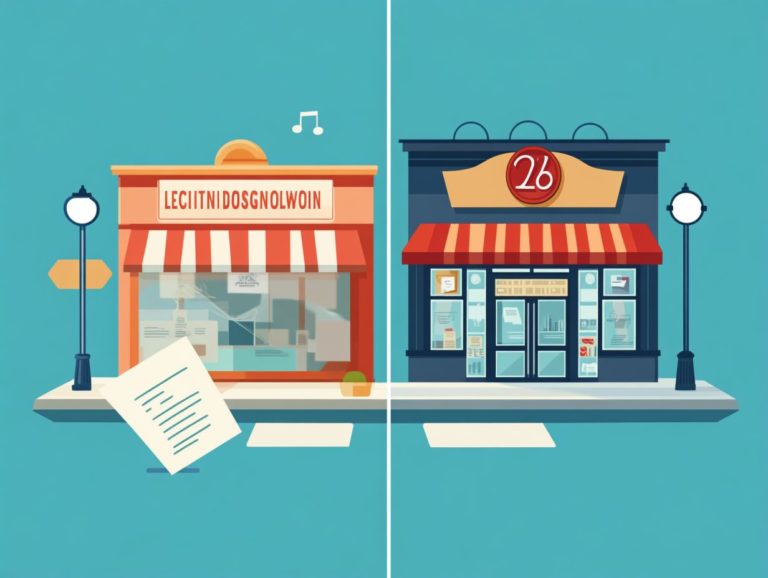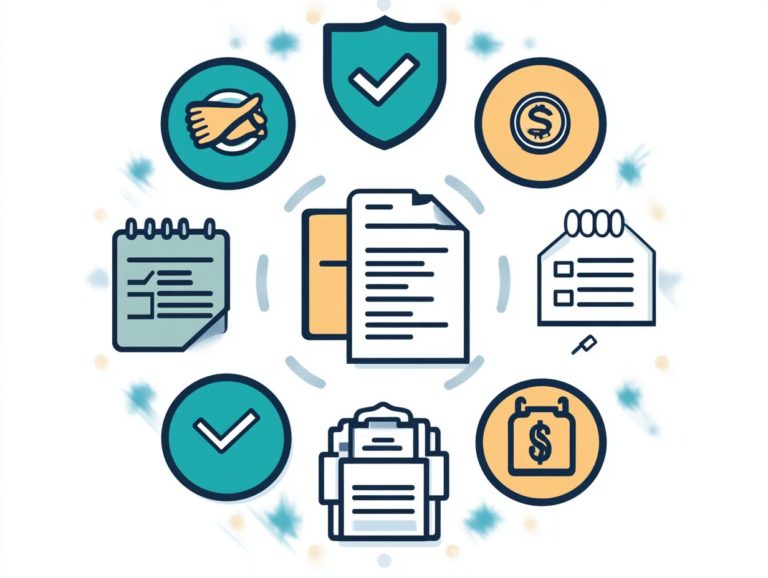The Benefits of Licensing Agreements for Small Businesses
Licensing agreements can be a game-changer for your small business, providing a strategic route to harness established brands and innovative products without the hefty financial strain typically associated with startups.
This article delves into the many benefits of licensing, highlighting low initial investments, flexibility, and significant growth potential. It explores various types of agreements, including trademark, patent, and copyright licensing, while offering essential tips for negotiation and drafting.
It also addresses potential risks and challenges, so you are prepared to navigate this dynamic landscape confidently.
Contents
- Key Takeaways:
- Benefits for Small Businesses
- Types of Licensing Agreements
- Negotiating and Drafting a Licensing Agreement
- Risks and Challenges of Licensing Agreements
- Frequently Asked Questions
- What is a licensing agreement and how can it benefit my small businesses?
- What are the different types of licensing agreements available for small businesses?
- How can licensing agreements help my small businesses expand into new markets?
- What are the financial benefits of licensing agreements for small businesses?
- Are there any risks associated with licensing agreements for small businesses?
- How can I find suitable licensing opportunities for my small businesses?
Key Takeaways:

- Licensing agreements give small businesses the opportunity to access established brands and products, allowing them to gain credibility and reach a wider customer base.
- With lower initial investment requirements, licensing agreements provide a cost-effective way to enter new markets and expand offerings.
- The flexibility and growth potential of licensing agreements allow small businesses to scale operations and increase revenue without taking on significant financial risk.
What is a Licensing Agreement?
A licensing agreement is a legally binding contract between you (the licensee) and the licensor. It grants you the right to use their creative ideas or products such as trademarks, copyrights, or patents under specific terms and conditions.
This agreement typically outlines the scope of use, the duration of the license, and any payments made based on sales you must pay in exchange for the privilege to develop, market, or distribute the licensed products or services.
These agreements are crucial across various industries, from technology to entertainment, as they empower companies to harness each other s innovations and creative assets. For instance, in the technology sector, licensing agreements allow software developers to distribute applications that incorporate patented algorithms, fostering collaboration and driving innovation.
Key elements you ll often encounter include:
- Royalties: Payments made based on sales generated from the licensed product.
- Exclusivity: Ensures that you can be the sole distributor within a defined market or territory.
Additionally, distribution rights specify how and where you can sell the licensed products, significantly influencing market reach and profitability for both you and the licensor.
Benefits for Small Businesses
Small businesses can quickly unlock fantastic rewards from licensing agreements. These strategic arrangements open the door to passive income while allowing you to leverage established brands and products.
Not only do they enhance your market recognition, but they also help mitigate the risks typically associated with product development and marketing efforts.
Access to Established Brands and Products
Accessing established brands through licensing agreements can significantly elevate your small business’s market presence. These brands typically possess a strong reputation and loyal customer base, giving you a competitive edge in today’s crowded marketplaces.
By leveraging the credibility and recognition of well-known brands, you can substantially cut down on your marketing costs and achieve faster product acceptance among your target audiences.
For example, a partnership between a small beverage company and a globally recognized soft drink brand not only boosts visibility but also instills confidence in consumers. They associate the licensed product with the trusted brand’s established quality.
As market demand shifts, you can swiftly adapt your offerings by aligning with respected brands, ultimately enhancing your own reputation while catering to consumer preferences.
Low Initial Investment
One of the key advantages of engaging in licensing agreements is the minimal initial investment required. This enables you to generate passive income streams without the hefty financial burden often associated with product development and marketing.
This approach allows you to allocate your resources more efficiently, enhancing your cash flow and profitability.
Rather than grappling with high costs for manufacturing and distribution, you can partner with a licensing agency that manages these aspects. This frees you to focus on your core competencies.
Through royalties, you can enjoy a consistent income that increases alongside your brand’s popularity, creating a sustainable model for financial success.
By minimizing upfront expenses, you can navigate market fluctuations with finesse, paving the way for long-term growth and stability.
Flexibility and Growth Potential

Licensing agreements offer you fantastic flexibility and big growth opportunities!
They enable you to venture into new markets and explore diverse product lines while minimizing the risks of entering foreign markets or developing new technology.
By strategically aligning with established brands or innovators, you can significantly enhance your reach without the hefty financial commitments often required for market entry.
These partnerships give you access to tested technologies and valuable insights from market testing, allowing you to refine your offerings in tune with consumer demand.
Leveraging licensing agreements can be a powerful catalyst for your growth strategies, as you tap into the resources and distribution networks of the licensing entity.
Embracing these collaborations can lead to innovative products that can be swiftly introduced to new demographics, effectively boosting your market share and driving sustainable growth.
Types of Licensing Agreements
Licensing agreements come in many forms, each crafted to suit distinct types of intellectual property, such as trademark licensing, patent licensing, and copyright licensing.
These agreements enable licensors to strategically monetize their assets while granting licensees the rights to leverage valuable intellectual property.
Trademark Licensing
Trademark licensing involves you, the licensee, receiving the right to use a registered trademark from a licensor in connection with designated goods or services. This arrangement allows you to tap into the established brand s recognition and reputation, elevating your market presence.
This dynamic not only boosts your visibility but also enhances the overall power of the brand, as the licensor s reputation serves as a valuable endorsement for your offerings.
Take, for example, the partnership between Disney and various toy manufacturers. By licensing its iconic characters, Disney enables these manufacturers to produce a range of merchandise, broadening the brand s market reach and increasing revenue with minimal investment.
As brand loyalty flourishes through such collaborations, the original trademark thrives, solidifying its position in consumers’ minds and creating mutual benefits for both you and the licensor.
Patent Licensing
Patent licensing gives you the power to leverage patented technology or processes owned by the licensor in exchange for mutually agreed-upon royalties. A patent is a legal right that protects inventions from being made, used, or sold by others without permission. This arrangement opens doors for innovation and product development without requiring extensive investments in research and development.
This practice benefits you significantly, especially in technology-driven industries, where the rapid pace of advancement frequently surpasses a single entity’s ability to innovate on its own.
By entering into licensing agreements, you gain access to cutting-edge innovations while mitigating the risks posed by competition. This collaborative approach cultivates a more dynamic marketplace, fostering partnerships that encourage shared knowledge and minimize duplication of effort.
As a result, you can realign your resources towards strategic initiatives, utilizing licensed technologies to enhance your offerings while maintaining agility and competitiveness in a constantly evolving landscape.
Copyright Licensing
Copyright licensing gives you, the licensee, the rights to reproduce, distribute, or display creative works owned by the licensor. This arrangement not only ensures that you generate a vital revenue stream through royalties but also safeguards the creator’s intellectual property rights.
In industries like entertainment, this setup is essential. Filmmakers and musicians depend on licensing their original content to earn income. In the publishing world, authors and publishers navigate detailed agreements to distribute books while ensuring fair compensation for everyone involved.
The software industry faces its own challenges regarding copyright licensing. Developers must protect their code from unauthorized use while still granting legitimate access to users.
Common practices, such as blanket licensing and negotiating terms, often lead to disputes, which can complicate relationships between creators and users of their works.
Negotiating and Drafting a Licensing Agreement

Successfully negotiating and drafting a licensing agreement requires careful consideration of several key factors.
You must pay close attention to the contract’s terms, the duration, the royalties, and any geographic limitations. Each of these elements can profoundly influence the dynamic between the licensor and the licensee.
Key Considerations and Best Practices
When you’re negotiating a licensing agreement, it’s vital to weigh factors like exclusivity, quality control, and dispute resolution mechanisms carefully. These elements are key to crafting a partnership that benefits both parties while safeguarding their interests.
It’s also important to clearly define the scope of the licensed materials, including the agreement’s duration and the territories it covers. Keep a keen eye on potential market changes that could affect the terms you’ve agreed upon.
It’s smart to include performance benchmarks that both sides can use to measure success and compliance over time. A solid grasp of intellectual property rights will help you steer clear of unexpected legal challenges.
By proactively addressing these considerations, you can lay the groundwork for a successful partnership, ultimately nurturing a strong and sustainable business relationship.
Risks and Challenges of Licensing Agreements
Licensing agreements offer incredible benefits but come with important risks and challenges. You must navigate potential pitfalls such as intellectual property infringement, maintain compliance with quality standards, and deal with the challenges of enforcing contracts with diligence and foresight.
By managing these elements well, you can maximize the benefits of your agreements while safeguarding your interests.
Protecting Intellectual Property
Protecting your intellectual property in a licensing agreement is crucial, ensuring that the rights of the original creator are maintained. This safeguards trademarks and copyrights while minimizing the risks of unauthorized use or infringement.
To achieve this effectively, you should delineate specific usage rights within the agreement, reducing the chances of misunderstandings that could escalate into disputes. It’s also essential to incorporate clear terms regarding the duration of the agreement and the renewal processes, allowing for flexibility while maintaining clarity.
One common challenge you may face is enforcing these agreements across various jurisdictions, where differing laws can complicate matters. Thus, best practices often include conducting regular audits and fostering open communication between all parties involved to proactively address any potential issues.
Leveraging legal expertise during this process can significantly enhance the protection provided to original creators, ensuring their rights are not only acknowledged but effectively upheld. Don t wait ensure your intellectual property is well protected today!
Ensuring Compliance and Quality Control
Ensuring compliance with established quality standards in your licensing agreement is vital for maintaining brand reputation and consumer trust. Failing to meet these standards can cause significant damage to both your interests and those of the licensor.
This commitment to integrity not only safeguards the money invested by both sides but also enhances the overall market position of the products involved. Implementing rigorous quality control measures is essential. Regular audits, clear specifications, and comprehensive training for everyone involved are key components.
Establishing open lines of communication streamlines this process. This allows for immediate feedback and adjustments.
Incorporating third-party inspections adds an unbiased layer of assessment for compliance. This fosters a collaborative environment where both you and the licensor feel accountable for upholding the agreed-upon standards.
Such proactive approaches protect your brand and help build long-term partnerships based on trust.
Frequently Asked Questions

What is a licensing agreement and how can it benefit my small businesses?
A licensing agreement is a legal contract that allows one party (the licensor) to grant permission to another party (the licensee) to use their creative works, such as trademarks, patents, or copyrights, in exchange for a fee. For small businesses, licensing agreements offer the opportunity to expand their brand, reach new markets, and generate additional revenue without the need for significant investments in production or distribution.
What are the different types of licensing agreements available for small businesses?
There are various types of licensing agreements, including trademark licensing, patent licensing, and copyright licensing. Trademark licensing allows small businesses to use a well-known brand name or logo to enhance their product or service.
Patent licensing allows small businesses to use patented technology or products without having to invest in their own research and development. Copyright licensing permits small businesses to use creative works, such as music or artwork, for their products or marketing materials.
How can licensing agreements help my small businesses expand into new markets?
Licensing agreements can help small businesses expand geographically by allowing them to use trademarks, patents, or copyrights in different regions or countries without the need for physical presence or additional resources. Additionally, licensing agreements can help small businesses enter new product or service categories by leveraging the expertise and established reputation of the licensor.
What are the financial benefits of licensing agreements for small businesses?
Licensing agreements can provide a significant source of revenue for small businesses, as they typically involve a licensing fee or royalty payment. A royalty payment means money paid based on sales or usage of the licensed property. This can help small businesses generate additional income without incurring extra production or marketing costs.
Are there any risks associated with licensing agreements for small businesses?
Like any legal contract, there are potential risks involved in licensing agreements for small businesses. These may include the failure to protect the licensed creative works, disputes over the terms and conditions of the agreement, or the possibility of the licensor granting similar licenses to competitors.
It is essential for small businesses to carefully review and negotiate the terms of the agreement to minimize these risks.
How can I find suitable licensing opportunities for my small businesses?
Small businesses can research and approach potential licensors directly, or use licensing agencies or brokers to help connect them with suitable licensing opportunities. It is important for small businesses to thoroughly evaluate the reputation and capabilities of the licensor before entering into any licensing agreement to ensure it is a good fit for their business goals and values.
Explore licensing options today and unlock new opportunities for your business!






